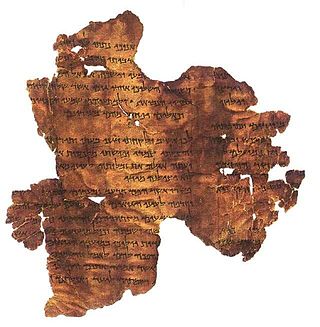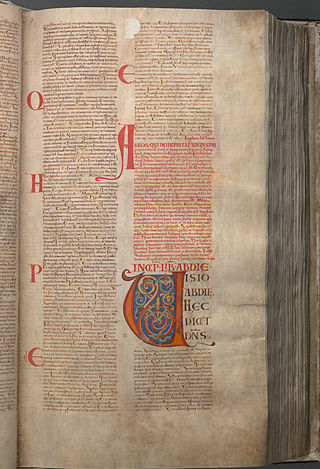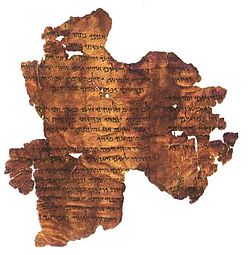
Hosea 1 is the first chapter of the Book of Hosea in the Hebrew Bible or the Old Testament of the Christian Bible. This book contains the prophecies attributed to the prophet Hosea son of Beeri, and this chapter especially sets forth the spiritual whoredom of Israel by symbolical acts. It is a part of the Book of the Twelve Minor Prophets.
Isaiah 7 is the seventh chapter of the Book of Isaiah in the Hebrew Bible or the Old Testament of the Christian Bible. This book contains the prophecies attributed to the prophet Isaiah and is one of the Books of the Prophets.
Isaiah 8 is the eighth chapter of the Book of Isaiah in the Hebrew Bible or the Old Testament of the Christian Bible. This book contains the prophecies attributed to the prophet Isaiah and is one of the Books of the Prophets.
Isaiah 30 is the thirtieth chapter of the Book of Isaiah in the Hebrew Bible or the Old Testament of the Christian Bible. This book contains the prophecies attributed to the prophet Isaiah, and is one of the Books of the Prophets. The Jerusalem Bible groups chapters 28-35 together as a collection of "poems on Israel and Judah". The Cambridge Bible for Schools and Colleges describes this chapter as "a series of Oracles dealing with the Egyptian Alliance and its consequences; the present state and future prospects of Israel, and the destruction of the Assyrians".
Isaiah 31 is the thirty-first chapter of the Book of Isaiah in the Hebrew Bible or the Old Testament of the Christian Bible. This book contains the prophecies attributed to the prophet Isaiah, and is a part of the Book of the Prophets. The Jerusalem Bible groups chapters 28–35 together as a collection of "poems on Israel and Judah". Biblical commentators Keil and Delitzsch note that "again and again", Isaiah returns to the subject of Judah's alliance with Egypt, this chapter being a notable example.
Isaiah 36 is the thirty-sixth chapter of the Book of Isaiah in the Hebrew Bible or the Old Testament of the Christian Bible. This book contains the prophecies attributed to the prophet Isaiah, and is a part of the Book of the Prophets. The text, describing the invasion of the Assyrian king Sennacherib to the Kingdom of Judah under Hezekiah.

Micah 1 is the first chapter of the Book of Micah in the Hebrew Bible or the Old Testament of the Christian Bible. This book contains the prophecies attributed to the prophet Micah, and is a part of the Book of the Twelve Minor Prophets.

Amos 6 is the sixth chapter of the Book of Amos in the Hebrew Bible or the Old Testament of the Christian Bible. This book contains the prophecies attributed to the prophet Amos, especially denunciation of both the sister nations for wanton security — Zion, as well as Samaria; the voluptuousness of Israel, Amos 6:1–6, shall be punished with desolation, Amos 6:7–11; their perversion of justice and vain confidence shall end in affliction, Amos 6:12–14. It is a part of the Book of the Twelve Minor Prophets.

Hosea 4 is the fourth chapter of the Book of Hosea in the Hebrew Bible or the Old Testament of the Christian Bible. This book contains the prophecies attributed to the prophet Hosea son of Beeri. In this chapter he reproves the people and priests for their sins in the interregnum following Jeroboam's death; hence there is no mention of the king or his family; and in Hosea 4:2 bloodshed and other evils usual in a civil war are specified. It is a part of the Book of the Twelve Minor Prophets.

Hosea 6 is the sixth chapter of the Book of Hosea in the Hebrew Bible or the Old Testament of the Christian Bible. This chapter contains the prophecies attributed to the prophet Hosea son of Beeri, about an exhortation to repentance and a complaint against Israel and Judah for persisting still in their wickedness. It is a part of the Book of the Twelve Minor Prophets.

Hosea 7 is the seventh chapter of the Book of Hosea in the Hebrew Bible or the Old Testament of the Christian Bible. The book contains the prophecies attributed the prophet Hosea son of Beeri and this chapter is about Israel reproved for multiple sins resulting in God's wrath against them for their hypocrisy. It is a part of the Book of the Twelve Minor Prophets.

Hosea 8 is the eighth chapter of the Book of Hosea in the Hebrew Bible or the Old Testament of the Christian Bible. This chapter contains the prophecies attributed to the prophet Hosea son of Beeri, about the impending destruction to Israel and Judah for their impiety and idolatry. It is a part of the Book of the Twelve Minor Prophets.

Hosea 9 is the ninth chapter of the Book of Hosea in the Hebrew Bible or the Old Testament of the Christian Bible. This chapter contains the prophecies attributed to the prophet Hosea son of Beeri, about the distress and captivity of Israel for their sins, especially their idolatry. It is a part of the Book of the Twelve Minor Prophets.

Hosea 10 is the tenth chapter of the Book of Hosea in the Hebrew Bible or the Old Testament of the Christian Bible. This chapter contains the prophecies attributed to the prophet Hosea son of Beeri, that was declared between Shalmaneser's first and second invasions of Israel, in which Israel is reproved and threatened for their impiety and idolatry, and exhorted to repentance. It is a part of the Book of the Twelve Minor Prophets.

Hosea 11 is the eleventh chapter of the Book of Hosea in the Hebrew Bible or the Old Testament of the Christian Bible. This chapter contains the prophecies attributed to the prophet Hosea son of Beeri, about God's former benefits, and Israel's ingratitude resulting in punishment, but God still promises restoration. It is a part of the Book of the Twelve Minor Prophets.

Hosea 12 is the twelfth chapter of the Book of Hosea in the Hebrew Bible or the Old Testament of the Christian Bible. This chapter contains the prophecies attributed to the prophet Hosea son of Beeri, and was delivered about the time of Israel's seeking the aid of the Egyptian king So, in violation of their covenant with Assyria. He exhorts them to follow their father Jacob's persevering prayerfulness, which brought God's favor upon him. As God is unchangeable, He will show the same favor to Jacob's posterity as He did to Jacob, if, like him, they seek God. It is a part of the Book of the Twelve Minor Prophets.

Hosea 13 is the thirteenth chapter of the Book of Hosea in the Hebrew Bible or the Old Testament of the Christian Bible. The book contains the prophecies attributed to the prophet Hosea son of Beeri. This chapter and the next one may belong to the troubled times that followed Pekah's murder by Hoshea. The subject is the idolatry of Ephraim, notwithstanding God's past benefits, destined to be his ruin. It is a part of the Book of the Twelve Minor Prophets.

Jeremiah 2 is the second chapter of the Book of Jeremiah in the Hebrew Bible or the Old Testament of the Christian Bible. This book contains prophecies attributed to the prophet Jeremiah, and is one of the Books of the Prophets. Chapters 2 to 6 contain the earliest preaching of Jeremiah on the apostasy of Israel. Verses 2:1 to 3:5 dramatize the ending of "marriage" between Yahweh and Israel.

Ezekiel 37 is the thirty-seventh chapter of the Book of Ezekiel in the Hebrew Bible or the Old Testament of the Christian Bible. This book contains the prophecies attributed to the prophet/priest Ezekiel, and is one of the Nevi'im (Prophets). This chapter contains a vision of the resurrection of dry bones, widely known as the Vision of the Valley of Dry Bones, in which Ezekiel at last assures the captives in Babylon that they will return from exile.

Ezekiel 23 is the twenty-third chapter of the Book of Ezekiel in the Hebrew Bible or the Old Testament of the Christian Bible. This book contains the prophecies attributed to the prophet/priest Ezekiel, and is one of the Books of the Prophets. This chapter forms part of a series of "predictions regarding the fall of Jerusalem", and is written in the form of a message delivered by God to Ezekiel. It presents an extended metaphor in which Samaria and Jerusalem are compared to sisters named Oholah (Samaria) and Oholibah (Jerusalem), who are the wives of God and accused of "playing the whore" in Egypt then cuckolding her husband while he watched.






